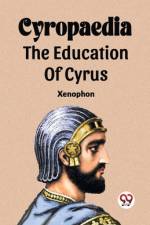von Xenophon
25,00 €
Anabasis (an "expedition up from") is the most famous work of the Ancient Greek professional soldier and writer Xenophon. It narrates the expedition of a large army of Greek mercenaries hired by Cyrus the Younger to help him seize the throne of Persia from his brother, Artaxerxes II, in 401 BC. The seven books making up the Anabasis were composed circa 370 BC. Though as an Ancient Greek vocabulary word, ᾰ̓νᾰ́βᾰσῐς means "embarkation", "ascent" or "mounting up", the title Anabasis is rendered in translation as The March Up Country or as The March of the Ten Thousand. The narration of the army's journey across Asia Minor and Mesopotamia is Xenophon's best known work, and "one of the great adventures in human history". Xenophon, in his Hellenica, did not cover the retreat of Cyrus but instead referred the reader to the Anabasis by "Themistogenes of Syracuse"-the tenth-century Suda also describes Anabasis as being the work of Themistogenes, "preserved among the works of Xenophon", in the entry Θεμιστογένεης. (Θεμιστογένης, Συρακούσιος, ἱστορικός. Κύρου ἀνάβασιν, ἥτις ἐν τοῖς Ξενοφῶντος φέρεται καὶ ἄλλα τινὰ περὶ τῆς ἑαυτοῦ πατρίδος. J.S. Watson in his Remarks on the Authorship of Anabasis refers to the various interpretations of the word "φέρεται", which give rise to different interpretations and different problems.) Aside from these two references, there is no authority for there being a contemporary Anabasis written by "Themistogenes of Syracuse", and indeed no mention of such a person in any other context. The Greek term anabasis referred to an expedition from a coastline into the interior of a country. While the journey of Cyrus is an anabasis from Ionia on the eastern coast of the Aegean Sea, to the interior of Asia Minor and Mesopotamia, most of Xenophon's narrative is taken up with the return march of Xenophon and the Ten Thousand, from the interior of Babylon to the coast of the Black Sea. Socrates makes a cameo appearance, when Xenophon asks whether he ought to accompany the expedition. The short episode demonstrates the reverence of Socrates for the Oracle of Delphi. Xenophon's account of the exploit resounded through Greece, where, two generations later, some surmise, it may have inspired Philip of Macedon to believe that a lean and disciplined Hellene army might be relied upon to defeat a Persian army many times its size. Besides military history, the Anabasis has found use as a tool for the teaching of classical philosophy; the principles of statesmanship and politics exhibited by the army can be seen as exemplifying Socratic philosophy. (wikipedia.org)






























